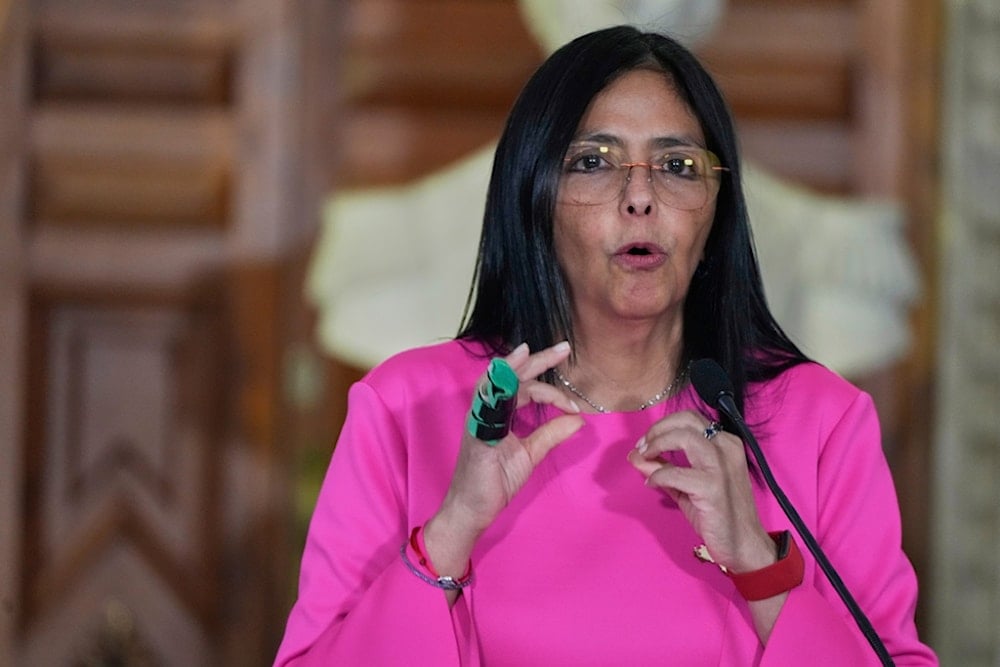Venezuela presses Trinidad over Exxon oil exploration plans
Venezuela demands details from Trinidad and Tobago on Exxon Mobil's planned oil and gas exploration near their maritime border, citing territorial concerns.
-

Venezuelan Vice President Delcy Rodriguez speaks to the press at the Foreign Office in Caracas, Venezuela, Monday, August 11, 2025. (AP Photo/Ariana Cubillos)
Venezuela has requested detailed information from Trinidad and Tobago regarding Exxon Mobil’s upcoming oil and gas exploration activities in a newly awarded ultra-deepwater block near their shared maritime border, according to diplomatic sources and internal documents, as reported by Reuters.
Vice President and Oil Minister Delcy Rodriguez raised concerns that potential discoveries in the area could encroach on Venezuelan territorial waters. She made the demand during a meeting in Caracas earlier this month with Trinidad’s acting head of mission, Dayne-Marc Chin Slick, according to a diplomatic note sent to Trinidad’s foreign minister.
Exxon Mobil was recently awarded the offshore block by Trinidadian authorities, marking the company’s return to the country’s energy sector. The block is located near the maritime boundary with Venezuela and to the northwest of the Stabroek block in Guyana, a region that has long been a source of geopolitical tension.
Venezuela's government is seeking clarity on whether the field tests and any possible discoveries may extend into its maritime territory. Rodriguez cited Article 8 of the border delimitation treaty, which obligates both nations to notify each other about planned exploration if the area lies within 500 meters of the boundary.
Trinidad and Venezuela are separated by only six miles (9.7 km) at their closest point.
Read more: Venezuela accuses ExxonMobil oil giant of conspiring against state
Energy Act suspended amid rising tensions
The request for information follows Venezuela's decision to suspend a wide-ranging energy agreement with Trinidad and Tobago. The suspension includes several joint gas ventures and was announced after President Nicolas Maduro criticized what he described as Trinidad’s pro-US position amid growing regional military tensions.
Earlier this week, Venezuela’s National Assembly declared Trinidad’s Prime Minister persona non grata, marking a significant downturn in bilateral relations.
This diplomatic friction mirrors a similar episode involving Guyana, where Venezuela’s objections led to the suspension of Exxon’s exploration in the northern part of the Stabroek block. That area was declared under force majeure, as Exxon was unable to proceed with operations.
Confidentiality standoff between Trinidad and Venezuela
According to a confidential government memo, Trinidad is willing to inform Venezuela about a seismic survey scheduled by Exxon for next year. However, it will not provide further details, citing contractual obligations.
“The Government of Trinidad and Tobago is bound by confidentiality provisions and, as a consequence, specific and detailed information on Exxon Mobil’s operations for Block TTUD 1 cannot be disclosed,” the Foreign Ministry’s internal note stated.
Exxon Mobil declined to comment on the matter when questioned by Reuters.
Further requests for responses from Trinidad’s Energy Ministry and Venezuela’s Oil and Information ministries by Reuters went unanswered.
Background: Dragon field and Loran-Manatee project
Until earlier this year, Venezuela and Trinidad enjoyed close cooperation in the energy sector. In April, before a change in Trinidad’s leadership, Caracas granted licenses to Shell and Trinidad’s National Gas Company to jointly develop the 4.2-trillion-cubic-foot Dragon gas field located in Venezuelan waters.
Venezuela had also agreed not to object to Trinidad’s development of its portion of the Loran-Manatee gas field, a reserve that holds approximately 10 trillion cubic feet of gas, 73% of which lies within Venezuelan maritime territory.
However, relations have soured under the new Trinidadian administration led by Prime Minister Kamla Persad-Bissessar. Rodriguez recently described the country’s stance as "hostile," further complicating prospects for regional cooperation.
Read more: Trinidad PM threatens force against Venezuelan vessels

 4 Min Read
4 Min Read










